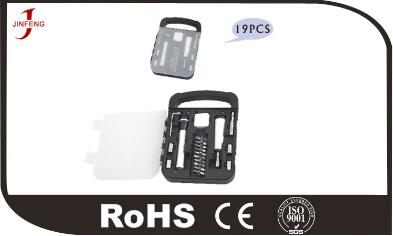Understanding the Essentials of a Standard Mechanics Tool Set
2024-08-10
A mechanics tool set is a fundamental resource for anyone engaged in vehicle maintenance, repair, or general mechanical work. Whether you’re a professional mechanic or a DIY enthusiast, having the right tools at your disposal is crucial. But what exactly makes up a standard mechanics tool set? In this blog, we’ll explore the essential tools commonly included in these sets and why each one is important.
1. Sockets and Ratchets
One of the core components of any mechanics tool set is the socket set, typically paired with a ratchet handle. Sockets come in various sizes (measured in both metric and SAE), allowing you to fit different nuts and bolts. The ratchet handle provides the necessary leverage to tighten or loosen these fasteners with ease. Sockets usually range from ¼-inch to ½-inch drive sizes, covering a wide range of applications from light to heavy-duty tasks.
2. Combination Wrenches
Combination wrenches are another staple in a mechanics tool set. These wrenches feature an open end on one side and a closed (box) end on the other, offering versatility for different tasks. The open end is great for quick adjustments, while the box end provides a secure grip on the fastener, reducing the risk of rounding off edges. Wrenches are typically available in metric and SAE sizes to accommodate various fastener types.
3. Screwdrivers
A set of screwdrivers is indispensable in any mechanics tool set. Standard sets usually include both flathead and Phillips screwdrivers in various sizes. These tools are essential for tasks such as removing and installing screws, adjusting clamps, or prying open parts. High-quality screwdrivers are designed with ergonomic handles for a comfortable grip, ensuring precision and control during use.
4. Pliers
Pliers are versatile tools included in most mechanics tool sets. Common types include needle-nose pliers, slip-joint pliers, and locking pliers (often known as Vise-Grips). Needle-nose pliers are perfect for reaching into tight spaces, while slip-joint pliers can adjust to different sizes of fasteners. Locking pliers can clamp onto objects with a firm grip, making them useful for tasks that require holding or twisting.
5. Hex Keys (Allen Wrenches)
Hex keys, also known as Allen wrenches, are simple yet essential tools found in mechanics tool sets. They are used for driving bolts and screws with hexagonal sockets. Hex keys are often needed for tasks such as adjusting brakes, assembling furniture, or tightening bolts in confined spaces. They come in various sizes, typically arranged in a foldable set or individual pieces.
6. Torque Wrench
A torque wrench is a precision tool that allows you to apply a specific amount of torque to a fastener, ensuring it is tightened to the correct specification. This is crucial in automotive work, where over-tightening or under-tightening bolts can lead to damage or failure of components. While not always included in basic sets, a torque wrench is a valuable addition for those working on engines or critical assemblies.
7. Extension Bars and Adapters
Extension bars and adapters enhance the versatility of your socket set by allowing you to reach fasteners in deep or hard-to-access areas. Extension bars increase the length of your socket wrench, while adapters enable you to use different drive sizes together. These tools are particularly useful when working on engines or other complex assemblies where space is limited.
8. Hammers and Mallets
Hammers and mallets are often included in larger mechanics tool sets. A ball-peen hammer is commonly used for shaping metal, while a rubber mallet can be used to apply force without damaging surfaces. These tools are essential for tasks like driving pins, striking chisels, or gently persuading parts into place.
9. Utility Knife
A utility knife is a simple but essential tool that comes in handy for cutting through materials such as rubber, plastic, or insulation. It’s useful for a wide range of tasks, from trimming hoses to opening packages, and its compact size makes it easy to store in your tool set.
10. Measuring Tools
Accurate measurements are crucial in mechanical work, which is why many tool sets include measuring tools such as tape measures, calipers, or rulers. These tools help ensure that parts are cut, aligned, and fitted correctly, preventing costly mistakes and ensuring a professional finish.
Conclusion
A standard mechanics tool set is more than just a collection of tools; it’s a well-thought-out selection of essential items designed to handle a wide range of tasks. From sockets and wrenches to screwdrivers and pliers, each tool plays a critical role in ensuring that you can tackle any mechanical job with confidence. Whether you’re a seasoned mechanic or just starting out, understanding the purpose of these tools will help you make the most of your tool set and get the job done right.



